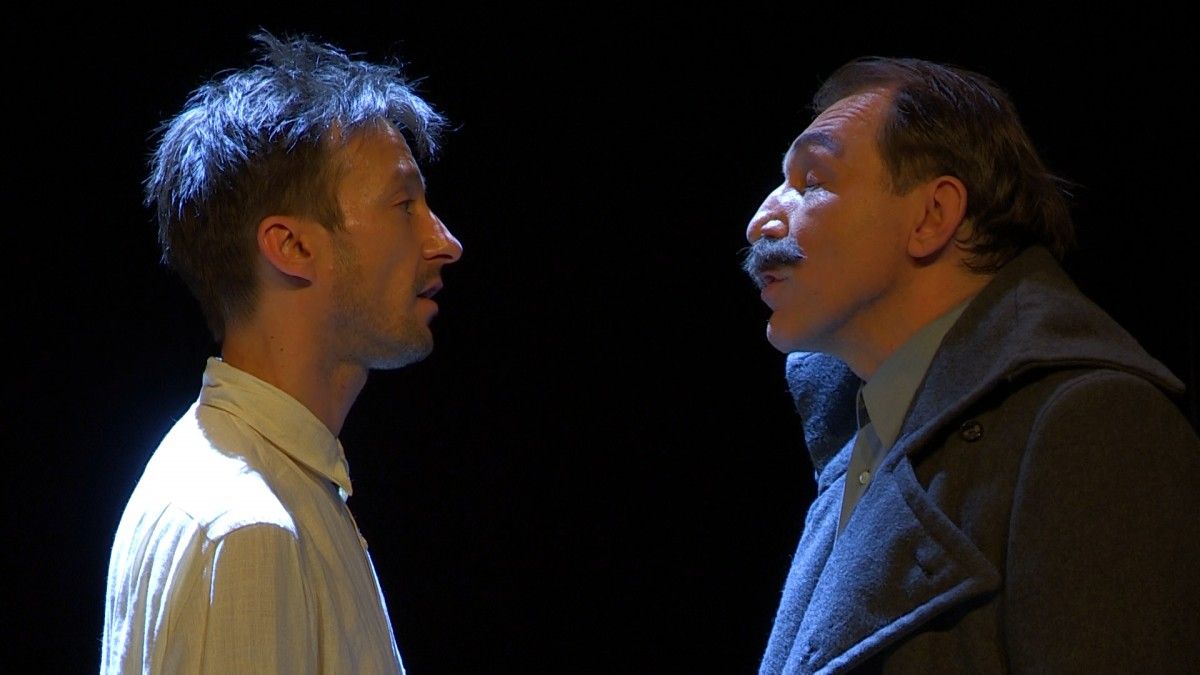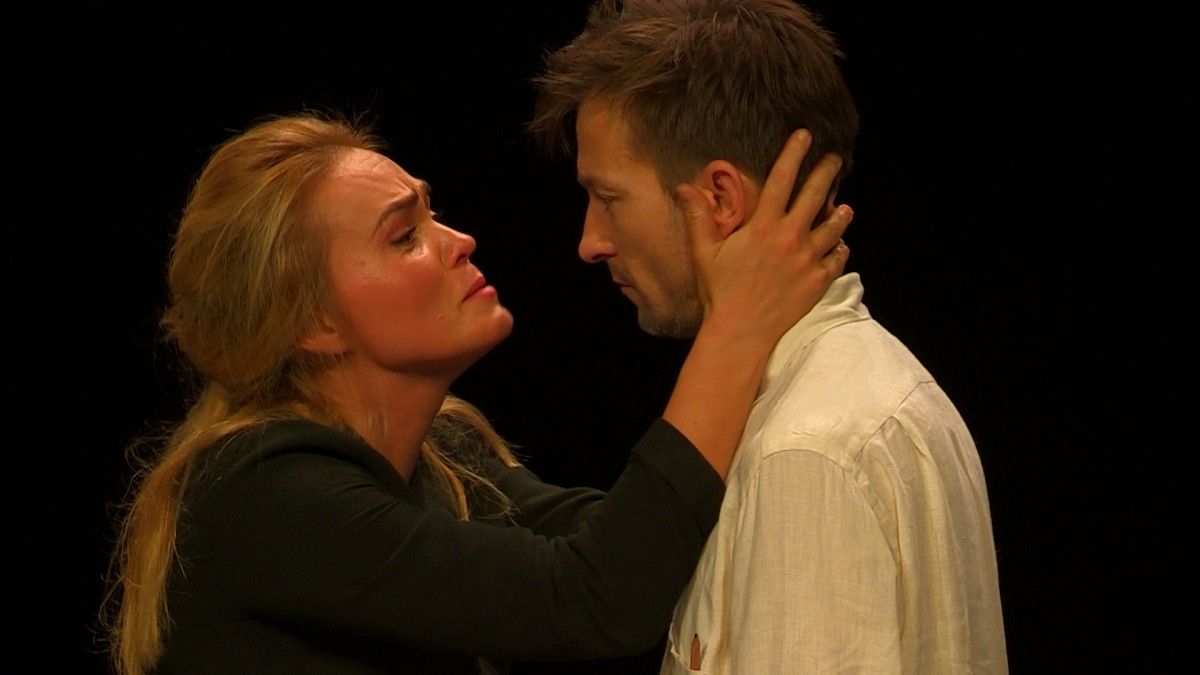INA Donates HRK 800 K Each To 3 Cultural Institutions Damaged In Earthquake
ZAGREB, June 18, 2020 - The INA oil company has donated a total of HRK 2.4 million to three cultural and scientific institutions, with each receiving HRK 800,000 to repair the damage caused by a destructive earthquake that struck Zagreb in March this year.
The Croatian Academy of Science and Arts (HAZU), Museum of Arts and Crafts (MUO) and Archaeological Museum on Thursday each received the donations in the HAZU palace, which too was damaged in the quake.
INA CEO Sandor Fasimon presented the donations to HAZU president Velimir Neidhardt, MUO director Miroslav Gasparovic and the director of the Archaeological Museum, Sanjin Mihelic.
Theatre in Croatia: Stalin Gets Mail in Zagreb
Just like theatre all over the globe, and especially in smaller countries in which plays are performed in shall we say, a ''small'' language, it must fight for a wider attention. Theatre in Croatia is no different.
Fewer and fewer mainstream media outlets find it adapt to be paying the critics, portals mainly try to cover daily politics, sports and calamities, and arts, in general, appear and disappear, often as surrogates in the days when sensations fail to occur.
Yet, without theatre, without film, without music, painting, sculptures, without poetry... how would we be able to escape reality for an hour or two, what could we connect our reveries to? (not talking about a new house and a big car here!). In theatre, for example, one not only detaches from the reality of his bills and bank statements, one also learns, about many, many things. For instance, the other day we learned that Stalin loved theatre. This historical fact is surprising for everybody’s image of him.
Theatre in Croatia is, despite obstacles, very much alive.
Some public theatres are very old, and are still there and continue producing, and, of course, alongside them there is a multitude of small, private theatre groups, professional or not, and in almost every bigger place.
Having managed a public theatre myself (meaning: major costs covered by the public budget), I've always admired those small private theatre enterprises that have chosen to make things happen and fight for their own, independent existence. And so, thanks to Stalin, we had an occasion to get into a friendly chat with one of those who dare. His name is Marko Torjanac, an actor by education, born and raised in Zagreb. His father was a renowned actor as well, and there's no surprise there. To run a private theatre, however, is quite another story.

''I was somehow never happy with what was going on those big stages. First as an actor, because to be on a payroll in a pubic theatre means not to be able to choose your roles, you have to do what you're told. Also, big theatres are bound to like big productions, the famous authors, so you can see Chekhov, Shakespeare and the likes all over the place. Very important, of course. Yet, theatre has so many messages to convey and therefore it has to be much more mobile, more elastic, much more accessible and possibly, coming to the audience, not vice versa.
So, I founded my ''Planet Art'' Theatre twelve years ago, and, well, we're still sailing,'' smiles Marko.
Does it mean you're only a founder and an actor?
Of course not! At first I had two people on staff to assist in the business side, like ticket sales, publicity and marketing, but as times have become more difficult, I have become all of those, a manager, a ticket sales director, a publicity manager, a stage hand, a technical manager, some kind of essential accountant, and what not. I was learning, and when in dire straits, one learns fast. My working day adds up to 15 or 16 hours sometimes. I'm not complaining, just at times I feel very, very tired.
How do you choose the plays?
I know many people from the world of theatre, many who follow theatre in various countries. They signal on something, either a production they have seen in Moscow, for instance, or they send a script. So I choose by my own feeling, what is there in some text to say to people, is it good enough to make them laugh, does it send a message worth the toil of the whole process, from asking for copyrights, to finding a good translator, to finding a proper cast, a costume designer, to posters and tickets.
We are here right after a truly wonderful production (Love Letters to Stalin) in which, as Stalin, you spend more than an hour under an obviously very heavy Soviet military coat and the moustache. You must be exhausted, but what made you put this text on stage?
Dehydrated, above all, but the applause of the audience is always rejuvenating, nourishing, rewarding enough for us not to feel tired. Love Letters to Stalin, theatre-wise, is a very simple production with only three characters, a desk and two chairs, but it's therefore so much more demanding for us actors. It's based on a true story about the correspondence between Stalin and Mikhail Bulgakov, the author of The Master and Margarita, considered one of the best novels of the entire 20th century, started by Bulgakov when after quite some time of having been banned from public life, he understood that the only possible help could come from Stalin himself.

The text goes deep into the psychology - of a helpless writer who is not allowed to publish or to be staged, of a wife that tries to save both their lives and their mental health, and of a rude dictator, the absolute power that does understand the value of the writer, but needs to be begged for mercy over and over again, of a society of most absolute control over every individual in one of its most merciless forms. Arts must beg for mercy from the authority in every society, so to speak, with helplessness of an artist under a strict regime being the most cruel form of it.

It is obviously very easy for you to travel with this production? Are you planning on any tours?
Yes, of course we are, that's how we make our living mostly. We have three other productions that commute outside of Zagreb as well. And, yes, my personal longtime wish is to show what we do to our people abroad. We also have comedies and can truly make them laugh, too!
Thank you, Marko, and chapeau for the persistence and good, good work!
And as for any of you from abroad that plan on visiting Croatia, do not forget to check what is on in a theatre near you.
Make sure to follow our dedicated lifestyle page for more on theatre in Croatia, and all other aspects of life, culture and the arts.
Minister of Culture in Zadar: Potential Revitalisation of Ravni Kotari?
Could a breath of fresh air be on the cards for Ravni Kotari?
Cultural Project for Šolta in Partnership with Island Movement
Šolta is stepping up its culture game thanks to a helping hand from the Island Movement.
Peace and All Good: Discovering Košljun Island (Photos)
Croatian islands are nowadays mostly known as booming tourist destinations, but if you look closely, you'll find an occasional gem which managed to escape the grind and retain its distinctive cultural microclimate. Meet Košljun, a darling islet located off the coast of Krk
Gašpina Mill: Why is Solin Attraction's Door Closed?
Could the mill's old doors be open once again any time soon?
Exhibition of the Week: Discovering Folk Costumes of Šibenik Archipelago
Our cultural highlight of the week takes us to Šibenik
Intangible Heritage of Croatia - Lastovski Poklad
TCN's Filipa Marušić gives us an intimate look at one of the island of Lastovo's incredible pieces of cultural heritage.
Long Live Saint Blaise! Dubrovnik Honours Patron Saint
Dubrovnik's patron saint and eternal protector is being celebrated in the Pearl of the Adriatic for the 1046th time.
St. Blaise in Brussels: Dubrovnik's Saint to be Celebrated in Belgium in 2018
Sveti Vlaho takes a short trip to... Brussels!


